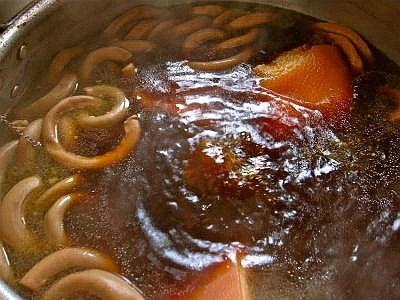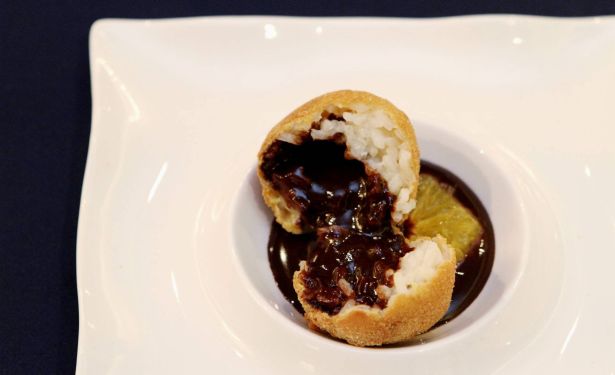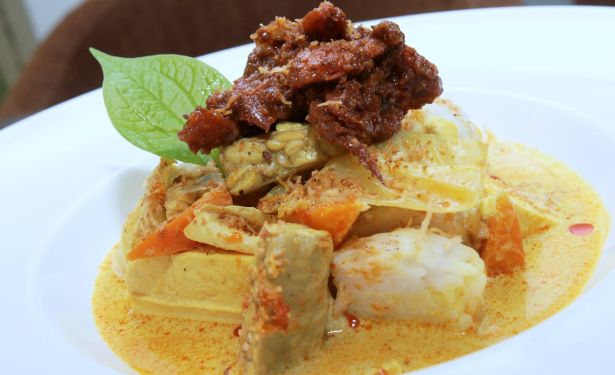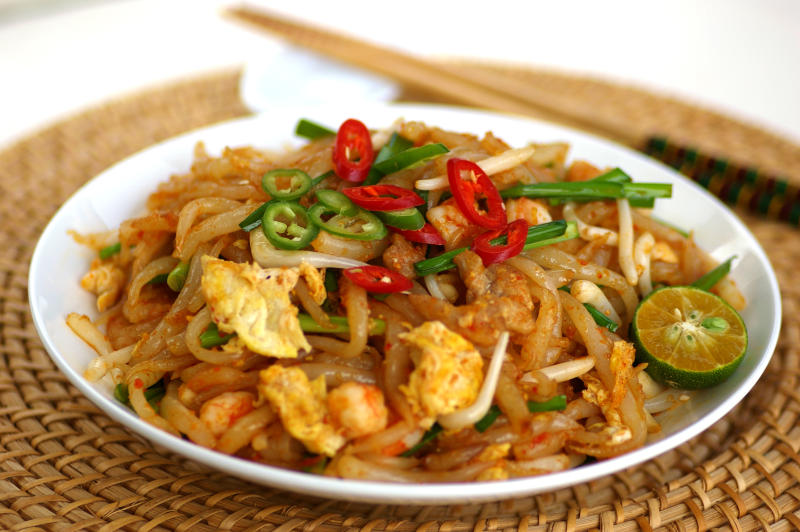Kedai Makanan Seong Huat
1 Jalan Larut
Georgetown,
10050 George Town, Penang.
Tel: 012 408 8345/012 427 8159
Opening hours: 5.30pm-10.30pm
Closed every other Friday
– See more at: http://www.themalaymailonline.com/eat-drink/article/kedai-makanan-seong-huat-a-kopitiam-with-two-identities#sthash.avvAz92z.dpuf
Dry bak kut teh is finally gaining popularity up north.
PENANG’S hawker fare is second to none, but dry bak kut teh is one dish the Pearl of the Orient cannot boast of – not until now, that is.
The stall that sits inconspicuously under a tree outside Kedai Makanan Seong Huat in Sungai Dua (directly opposite Tesco Extra Sungai Dua) and hidden by a huge canvas with a picture of Jackie Chan in a yellow tracksuit, is always busy as customers line up to place their orders.
The spicy and sweet dry bak kut teh is served with its usual condiments. Although yam rice is available, I prefer white rice simply because it does not “distract” from the true taste of the meaty dish.
The man behind the wok, Yeoh Chin Leong, 48, says he can’t take credit for bringing the dish to Penang.
One of my customers, an old man, told me the dry bak kut teh has been around for more than a decade here but demand for the dish, which is quite common in the central region, just never caught on.
“I take it as a very big compliment when he credits me for popularising it now,” he says, beaming with pride.
Recalling how a vernacular newspaper reporter would always request for an interview whenever he came by to eat, Yeoh says he had humbly declined on several occasions. The journalist is now a friend.
“I told him that there really wasn’t much to tell but he could write about the dish if he liked ” this is the first time I have agreed to an interview.
“It’s not because I’m snobbish but I really don’t see how my story is interesting to anyone.

The pork meat, bones, innards and tongue are boiled for about six hours daily. The soup is also used to cook the dry bak kut teh.
“I’m not a smart man ” I’m just a father who is trying to earn enough to put my two kids through school.
“It’s funny how I’ve been serving roast duck for so many years yet it never gained such a strong following,” Yeoh shrugs.
He says the secret behind his tasty bak kut teh offering is a no-brainer. He always keep a small bowl of soup for the next day to ensure that those who come early won’t have to stomach a “weak tasting” stock.
“The pork, lots of it, is what makes the soup taste so good. I boil the meat, bones, innards and tongue for about six hours daily. That’s why the aroma is stronger than the medicinal herbs,” he shares, stressing the importance of fresh, quality pork.
On average, Yeoh sells three to four large pots of the soup daily. The challenge, he says, is to ensure consistency in both aroma and taste.
“We can put in the same amount of ingredients, which is 30kg to 40kg of pork, yet the aroma may differ slightly because of the taste of the meat,” he says.
Doing it his way
The dry bak kut teh is ready in seconds as Yeoh pours a bit of soup into a hot wok and stirs it with a mix of sauces, pork meat and “spare parts”, dried squid, enoki mushroom, ladies fingers and dried chillies.
When he first started, he wasn’t as skilful with the wok but observing others has made him a pro.
“I’m largely self-taught,” he laughs, adding that roasting ducks, which he did for 20 years, was much trickier.
He is genuinely surprised that his version of the dry bak kut teh has put him on the list of Penang’s top hawker fare.
“I’ve only been selling bak kut teh for about four years after a friend suggested a change. He took me to a famous coffeeshop selling the dish and asked if I could cook something as tasty.
“I got the bak kut teh recipe from another friend and the rest is history,” he says matter-of-fact.
The dry version of the dish was a result of some “self-modifications”, he shares.
“I’ve changed the recipe for the soupy version a few times because I was curious why 70% of my customers only order the dry version. Until today, the latter is still the best-seller,” he says.
When it is pointed out that the soupy version is not “strong” compared to other stalls famed for using lots of eok chai (medicinal herbs) in the traditional dish, Yeoh nods in agreement.
“The original recipe for the soup had a very strong medicinal aroma and a lingering after taste.
“The older generation praised it, but the problem was that I was only cooking for a very small group. The young ones who form the bulk of my customers did not like it so I had to cater to them,” he says.
Having sampled the dish at famous dry bak kut teh stalls from the other states, Yeoh says he is sticking to his own style.
He points out that the ones he had in Klang, Kuala Lumpur and Petaling Jaya has dried shrimp sprinkled on which he doesn’t fancy.
“To be honest, I cook it the way I personally like it. I’m lucky others seem to share my preference,” he says.
He’s since had people from Ipoh and Kuala Lumpur asking him to teach them how to prepare the dish, promising to only open a stall in those cities.
“One guy even asked if I was from Kuala Lumpur after praising my dry bak kut teh for its authentic taste,” he says, smiling.
Yeoh has also declined offers to open up branches of his stall elsewhere.
“To be honest, I’m a very lazy guy. I am satisfied with what I’m earning.
“With only one stall to worry about, I have time to pick my kids up from school, do the marketing myself and even rest in between all that,” he says.
He admits that handling more than one stall is too burdensome because the quality would be compromised.
Sounding like a perfectionist, Yeoh still insists on doing all the cooking himself.
Despite having a staff of six, he says he feels uneasy watching others take on the role of cook.
“Customers come to my stall to taste my cooking ” they want to see me stir-frying the dry bak kut teh and scooping the soup.
“I don’t think they’d be happy otherwise.”
Fans for life
Universiti Sains Malaysia postgraduate student Brendan Lo Rick is a regular.
The university is a mere five minutes away so unsurprisingly, the majority of Yeoh’s customers are students.
Lo Rick, from Sarawak, had his first taste of the dry bak kut teh when he moved to Penang last year.
“It was recommended by a friend living in the area ” it was one of the first Penang hawker dishes that was recommended to me when I arrived here from Kuching.
“Now, all other dry versions I’ve had seem bland by comparison,” he says.
The 25-year-old waxes lyrical about the “well-marinated ingredients”, describing the herbs used as “super fragrant”.
“I love the idea of cooking the bak kut teh until the soup is dry, leaving only a flavorsome gravy, thick and rich”.
“The vegetables provide a nice balance for the meaty meal,” he says.
Lo Rick’s girlfriend is an even bigger fan of the dish and many of his friends drop by the shop for their dry bak kut teh fix, often bringing their outstation friends along.
“It’s definitely the best-selling dish in the coffeeshop. The service is great – highly recommended,”he gushes.
Yeoh’s stall opens from 11am to 2pm and from 4pm to 10pm daily except Mondays.
He charges RM7 for the dry version and RM6 for the soupy variant.
“The dry bak kut teh is a little more expensive because it is more difficult to make,” he says.
Yeoh doesn’t want his children to inherit the booming business.
He says it’s a job for retirees because “you don’t need to think and it’s so easy – everything is automatic”.
He says hawkers are quite a complacent lot because they don’t have to be responsible for anyone but themselves.
“As a hawker, if you don’t feel like coming to work, you don’t earn money ” no one else cares.
“I want my kids to work for people so that they learn how to work in a team, exercise the mind and to be responsible for others.”





